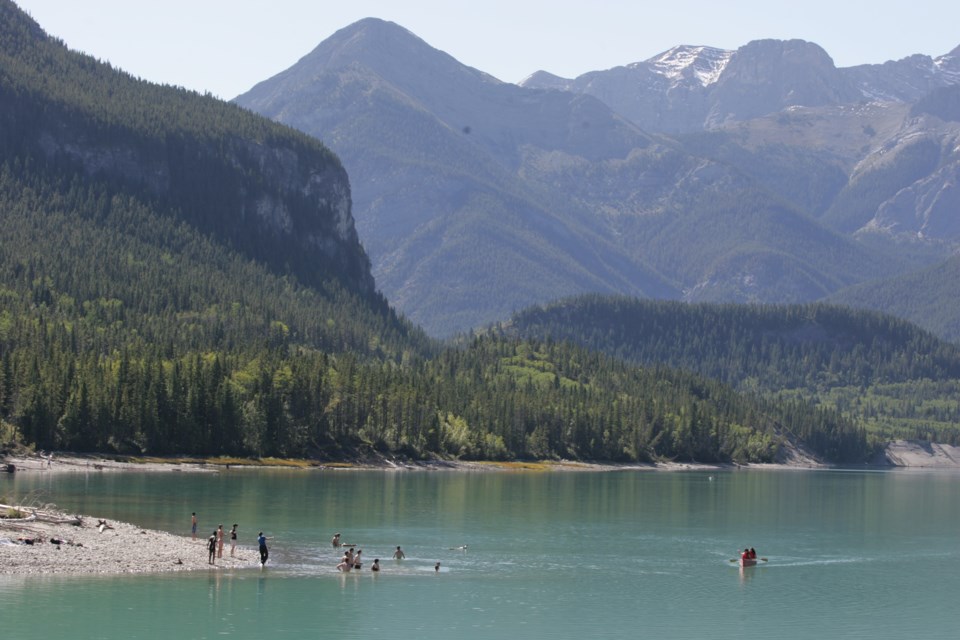Barrier Lake and Elbow Valley visitor centres in Kananaskis Country will also close and several other provincial campgrounds will have shorter operating seasons, with late openings and early closures.
Conservationists and recreation groups are shocked, noting the Feb. 27 budget decisions surrounding Alberta Parks make no sense given the UCP government’s plans to double tourism spending from $10 billion to $20 billion by 2030.
“While we’re reducing staff capacity and the number of campgrounds, we’re increasing the number of people in our parks,” said Sarah Elmeligi, a local landscape ecologist and former planner with Alberta Parks.
“Where are all these tourists going to go camping? We know Kananaskis Country receives three million-plus visitors every year. We know there’s an increasing, almost insatiable demand for camping opportunities.”
The government assessed all 473 sites within the Alberta Parks system and decided to remove 164 of those for a different management model, including 19 provincial parks and natural areas, in addition to full or partial closure of 20 other sites.
The sites will have their legal park designation removed and could be privatized or run by non-profits or municipalities. Work is underway to determine if some of these facilities and areas could stay open under a public lands management model.
The government estimates the campground closures will save an estimated $5 million a year. In addition, another $5 million will be chopped from Alberta Parks this year, which also includes loss of seasonal staffing positions, such as trail crews and interpreters for example.
Government officials say it cost $86.1 million to run Alberta Parks service in 2018-19, with $33.4 million collected in revenue – and they say the Parks system cannot afford to continue to be such a revenue sinkhole.
They say changes to the Parks model, with the sale or transfer of sites to the private sector, municipalities or non-profits could continue to provide economic and recreational benefits to local communities.
Environment and Parks Minister Jason Nixon said the changes would allow the province to focus its energy on “renowned signature destinations” and examine opportunities for other groups to operate smaller parks and day-use areas.
“Albertans have expressed an interest in taking a more active role in the operation of some areas traditionally run by the province,” he said in a news release.
“In order to facilitate this, and to renew our commitment to our ‘crown jewel’ destinations, we will be offering Albertans, non-profits and First Nations the opportunity to work with our government and with parks societies on exploring these important partnerships.”
Banff-Kananaskis MLA Miranda Rosin stands by her government’s decision, noting the 20 campgrounds to be closed or partially closed were losing millions of dollars every year.
“The truth is we still have hundreds of campgrounds across the province, but we owe it to the taxpayer to not just flush their money down the toilet on ventures that lose money,” she said.
“When it comes to the 164 other sites, they are now being outsourced. All we’re really doing is looking for partners to help us maintain facilities in these parks.”
Conservationists say that removing 164 campgrounds and day-use sites from the management of Alberta Parks and putting them into the private sphere exposes these areas to commodification and development.
They note that privatization is essentially irreversible and will likely to substantially increased camping costs.
Alberta Wilderness Association (AWA) has serious concerns, too, noting these areas provide important recreational and ecological values.
“The government statement that the 164 sites are 'mainly small and underutilized provincial recreation areas' underplays the conservation and recreation values that these areas provide,” said Grace Wark, AWA conservation specialist. “In fact, many of these sites are well-loved and incredibly popular.”
While supportive of partnerships, Wark said AWA is concerned about treating Alberta’s Parks systems as a for-profit enterprise rather than a land-use planning tool and a means of facilitating public use of natural spaces.
“Alberta’s parks system is in place to promote things like public health and well-being as well as to manage the integrity of our ecological systems – so when we heard about privatization happening, we’re concerned,” she said.
News of the changes to Alberta’s parks systems seemed to come out of nowhere, with Wark adding it’s disappointing the provincial government pushed through on these plans without public consultation
“The overwhelming majority of Albertans do have a stake in how our parks system are managed,” she said.
MLA Rosin, however, didn’t see the need for public consultation on this dramatic change in direction.
“If I may, that’s because the only campgrounds that are closing were those that don’t make money and that lose money actually,” she said.
“We don’t expect the public to be accountants combing through every number in the books; that’s the government’s job. The government’s job is to look at the finances and make the economic decision on what makes sense.”
Critics of the decisions say Albertans love to camp and now opportunities to do that are potentially going to be taken away.
“That’s sad. Hanging out with our families and friends that way is very much a part of our cultural identity as Albertans,” Elmeligi said, noting she also has concerns the decision will lead to more random camping.
“You can’t take all the toilets off the landscape and ask people to not go. Combine that with reduced staff capacity, which will mean less conservation officers on the ground enforcing existing regulations.”
As part of the budget, it was also announced that the base camping rate at most campgrounds will rise by $3 and rates for power, water, sewers and showers will increase by $1 where services are available. Access to provincial parks and day-use areas remains free.




